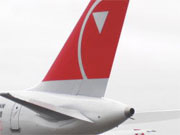Photos
| ||||||||||||||||||||||
 |
| At Holiday Inn in Minneapolis strikers in street clothes chanted "scabs go home" and "scab hotel." (MPR Photo/Sanden Totten) |
Minneapolis, Minn. — By mid-afternoon on Thursday, perhaps 200 striking mechanics and supporters had gathered outside the Holiday Inn Metrodome in Minneapolis -- one of three hotels where the union says Northwest is housing replacement workers.
Ted Ludwig, president of the mechanics union's Twin Cities local, stood in front of a bus, empty except for the driver.
"We're going to block any bus that tries to come to this hotel today and tries to pick up scab workers," he declared.
Ludwig said a group of replacements was already overdue to make their way from the front door to the waiting bus. Every few minutes, a man in a suit emerged from behind security guards at the hotel to survey the situation. A trip inside the lobby found about 20 replacement workers at the back of the room, many looking confused and nervous.
Meanwhile, a bus carrying a few replacements from another hotel stopped at a traffic light on the corner, and union members pounced.
The bus moved on when police cleared the way. Later, about two hours after union members first arrived, police cleared a similar path out the hotel's back door for the workers waiting inside. Protests at the other two hotels had not been successful in significantly delaying buses. But union president Ludwig declared the event a success, saying it had made the workers here late for the evening shift-change at Northwest.
"We will continue to do this, we will continue to disrupt the traffic of scabs into the airport as often as we can," he said.
The angry taunts convinced at least one replacement worker to move out of the hotel to his home in St. Paul.
"I was going to my room, and I just said, forget it -- I'll have someone else come later and get my stuff, said the 29-year-old man, who declined to give his name for fear of harassment. He said he would continue to go to work at Northwest.
"It's good work. I mean, the airlines are in enough trouble -- they don't need this. We're just doing our job, I guess."
Northwest said it did not expect the protests to disrupt operations. The airline did warn investors, though, that the company's finances could be severely disrupted in the future by the steep rise in fuel prices following Hurricane Katrina. In a filing with the SEC, Northwest says it now expects to spend 50 percent more on jet fuel this year than it did last year, hastening its descent toward bankruptcy.
The airline also said it is likely it will need to raise its $1.1 billion labor cost savings target. That's no surprise to financial analysts like Ray Neidl, who had already been saying the target was, "a little light." Neidl says even the labor cuts are just a part of the solution for a company that also faces huge payments to its pension funds.
"They're going to need relief from Congress on the pension payments, and in my opinion to raise some additional cash through borrowing to get through the winter. They've got some significant work ahead of them even if they work through the strike," according to Neidl.
Northwest is still negotiating to get concessions from flight attendants and ground workers. Pilots agreed last fall to annual cuts of $265 million. The pilots union now says, much earlier than expected, that it is ready to go back to the table and offer more.
The company has called for another $322 million in annual savings from pilots. Northwest pilots union head Mark McClain says that will take the union into the realm of deep cuts to its members -- maybe too deep.
"We have to look for areas where we can provide some cost relief, some cost-cutting, and balance taht off of how much is too much as far as income and when it comes to layoffs. We're going to have to analyze very carefully where we can bargain, and were we take our chances in the courts in front of a bankruptcy judge," McClain said.
Northwest has suggested a plan that would lay off more than 1,000 pilots and leave those remaining with an overall pay cut of more than third. Talks between pilots and the company will start next week. McClain says how quickly they move depends on what's on the table.





